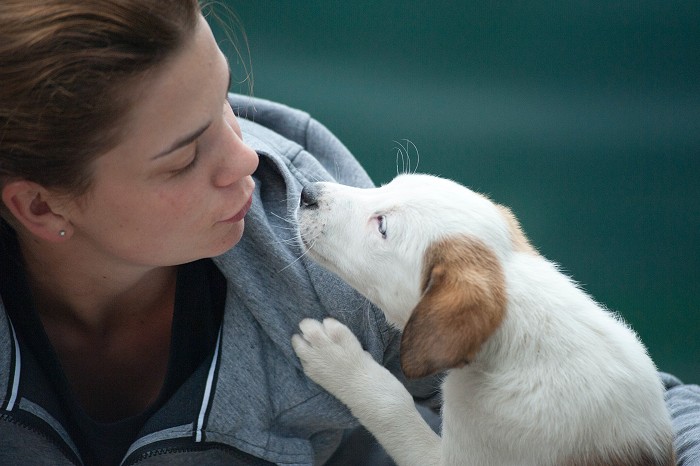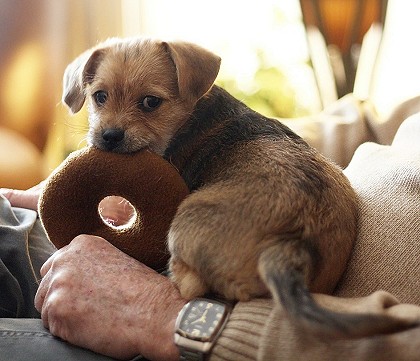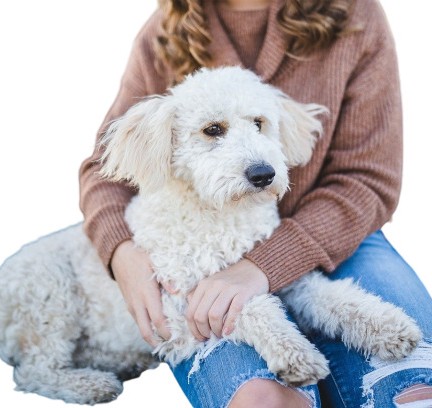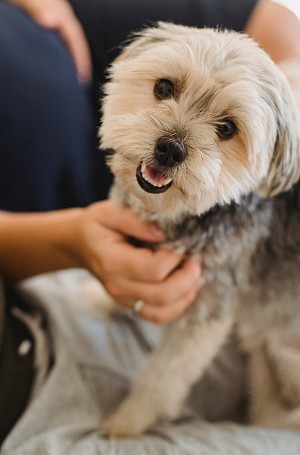Stop Over-Dependency and Demanding Behaviors
By Michele Welton, Dog Trainer, Breed Selection Consultant, Author of 15 Dog Books
A common problem in misbehaving pups is their view that being petted is a right that they can demand at will.
 "Jake, stop pestering me!" Kathy was sitting on the sofa trying to read. She had been petting her dog, but after a while she just wanted to read. Jake shouldered himself between her knees and wedged his head into her lap. Kathy pushed him away, but he kept charging right back.
"Jake, stop pestering me!" Kathy was sitting on the sofa trying to read. She had been petting her dog, but after a while she just wanted to read. Jake shouldered himself between her knees and wedged his head into her lap. Kathy pushed him away, but he kept charging right back.
Don't pet your dog each and every time he solicits it.
Soliciting means nudging or mouthing your hand, pushing himself against you, or pawing at you.

Most dogs will solicit for attention and petting. This is normal behavior, but should be monitored for excessiveness, especially if the pup has other behavioral issues.
Now, virtually every dog solicits petting sometimes. That's perfectly normal... and nice!
But when it happens again and again and the pup won't take No for an answer, it crosses the line to being demanding. That's a red flag because pups who are allowed to be demanding usually go on to develop additional behavior issues.
Stay in control of soliciting behavior. Send a pushy pup to his bed (Go bed ), wait 5 minutes, then tell him to Come and then Sit. Only then should you pet him.
Now your petting becomes his reward for following your commands rather than your following his command of "Nudge nudge nudge, I insist that you pet me right now." It's another subtle leadership thing.
YOU should decide when to stop petting.

Suppose you're sitting on the couch watching TV. You invite your dog up to be petted.
After 15 seconds (yes, seconds... not minutes!) of petting, tell him, "That's enough" or "All done" or "No more" (choose a phrase and stick to it). Take your hand away.
If he settles down and chews contentedly on his toy or even goes to sleep, great. But if he nudges for more petting, repeat your phrase and put him on the floor. Go on watching TV.
If he persists in seeking attention, send him to his bed: "Go bed". Or put him in his crate or ex-pen. Don't pet him or speak to him as you do so. Simply lead him into his crate or pen, and close the door.
Finally, don't hold or pet your pup too much.
In my experience, most pups with behavior issues are being petted and fondled too much. Fifteen seconds of sincere affection and soft happy talk is plenty at any given time.
If you hold your dog too much, or sit on the couch absently stroking him for a half-hour while you watch TV....
You're promoting an unhealthy dependency.

Some dependent pups become so accustomed to fondling and cuddling that they don't know how to face the world without your hand resting on their back.
When you leave them home alone, they experience a form of separation anxiety in which they become nervous, even frantic. They might vent their anxiety by barking, digging holes in cushions, or ripping off your baseboards. Entire rooms have been destroyed by dogs with dependency-based separation anxiety. If you leave them in a crate instead, they may break their teeth or toenails trying to escape.
Making your pup dependent on being held and stroked is really awful for his mental and emotional health.
An overly-dependent pup might become a resource guarder who growls when another person or pet approaches "his" (your) lap or "his" (your) petting hand.
And please don't post a "cute" video on YouTube of your dog sitting on your lap and lifting his lip or pitching a fit at your significant other who's pretending to approach you or snuggle with you.
No, this dog is not protecting you or showing how much he loves you. He's disrespectfully claiming a resource (your lap and/or hand)... which you have (inadvertently) encouraged him to do.
So instead of posting that video, post the one where you tell him, "No. Off." and put him on the floor to stand on his own four feet.
Dependency and resource guarding aren't funny or cute. They're psychologically stressful for your dog and you need to stop them before he becomes truly nasty or neurotic.
How do dogs like to be petted?

Every dog is different, but most dogs enjoy it when:
- You scratch their chest and between their front legs.
- You rub the base of their ears. Some pups have a favorite ear, while others enjoy both ears in an alternating pattern.
- You scratch atop their hindquarters at the base of their tail, which is a deliciously ticklish spot for many pups, who might respond by quivering their skin, or stretching their body, or even tapping a hind leg up and down.
- You rub their belly. Some might even sprawl on their back with a rapturous expression on their face. Other pups find this position too vulnerable and are reluctant to allow belly rubs.
How do dogs NOT like to be petted?
- Most dogs don't like being patted on their head. Pat-pat-pat feels impersonal, jarring, and annoying. People who don't know much about dogs, or who don't like dogs all that much, tend to pat them.
Toy dogs especially are apt to shy away from a giant hand descending from the sky toward their vulnerable little head. Before you let strangers pet your toy dog, show them how to scratch their fingers on the pup's chest rather than touching his head.
- Most dogs don't enjoy being hugged. They usually tolerate it, but they don't like feeling wrapped up. Especially don't let a child hug a dog. A common cause of dog bites is the child wrapping her arms around the dog's neck – 70% of dog bites to a child under the age of 10 are bites to the face.
- Don't kiss a dog. Dogs view a kiss as a "face lick", which in the canine world is done BY followers TO leaders. So if you kiss a dog, he's more likely to see you as a follower instead of a leader.
On the other hand, it's okay for him to give you kisses, if you don't mind it. Again though, you should be wary of letting kids put their faces near a dog's mouth "to be kissed." Remember that 70% bites-to-the-face statistic.
My best-selling books – now available FREE on my website
 Respect Training For Puppies: 30 seconds to a calm, polite, well-behaved puppy is for puppies 2 to 18 months old. Your puppy will learn the 21 skills that all family dogs need to know. Click here to read for free.
Respect Training For Puppies: 30 seconds to a calm, polite, well-behaved puppy is for puppies 2 to 18 months old. Your puppy will learn the 21 skills that all family dogs need to know. Click here to read for free. Teach Your Dog 100 English Words is a unique Vocabulary and Respect Training Program that will teach your adult dog to listen to you and do what you say. Click here to read for free.
Teach Your Dog 100 English Words is a unique Vocabulary and Respect Training Program that will teach your adult dog to listen to you and do what you say. Click here to read for free. 11 Things You Must Do Right To Keep Your Dog Healthy and Happy helps your dog live a longer, healthier life. Get my honest advice about all 11 Things before you bring home your new puppy, because some mistakes with early health care cannot be undone. Click here to read for free.
11 Things You Must Do Right To Keep Your Dog Healthy and Happy helps your dog live a longer, healthier life. Get my honest advice about all 11 Things before you bring home your new puppy, because some mistakes with early health care cannot be undone. Click here to read for free.
